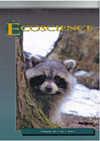Vascular Plant Communities in the Polar Desert of Alert (Ellesmere Island, Canada): Establishment of a Baseline Reference for the 21st Century
IF 1.3
4区 环境科学与生态学
Q3 ECOLOGY
引用次数: 2
Abstract
ABSTRACT The startling warming of the Arctic is driving important environmental changes, but vegetation responses have been spatially heterogeneous and difficult to predict. In this context, establishing new ecological baselines and initiating monitoring schemes are essential. We conducted systematic plot-based surveys in the polar desert surrounding Alert (Nunavut, Canada). We aimed at (1) identifying distinct plant communities, (2) characterizing community attributes, including diversity and abundance, as well as environmental variables associated with each community, and (3) establishing a georeferenced baseline with permanent field markers allowing robust resurveying. We used hierarchical clustering to categorize cover values of vascular plant species, cryptogams, and ground substrates from 1,320 quadrats (1 m2 each) surveyed in 264 vegetation plots. Five plant communities were identified, with one community associated with each of the barren and mesic habitats, and three communities associated with wetlands. The mean biotic covers were generally higher at Alert (13–98%) compared to other polar deserts in the Canadian Arctic Archipelago. A total of 250 quadrats from 50 vegetation plots were permanently marked, and a database describing all plots is available online. This study improves our understanding of High-Arctic plant communities and establishes an important vegetation monitoring reference at the northernmost permanently inhabited settlement on Earth.加拿大埃尔斯米尔岛极地沙漠的维管植物群落:21世纪基线参考的建立
摘要北极地区令人震惊的变暖正在推动重要的环境变化,但植被的反应在空间上是不均匀的,很难预测。在这方面,建立新的生态基线和启动监测计划至关重要。我们在Alert(加拿大努纳武特)周围的极地沙漠中进行了系统的基于地块的调查。我们的目标是(1)识别不同的植物群落,(2)表征群落属性,包括多样性和丰度,以及与每个群落相关的环境变量,以及(3)建立一个具有永久性田间标记的地理参考基线,以便进行强有力的复测。我们使用层次聚类对264个植被区调查的1320个象限(每个象限1平方米)的维管植物物种、隐配子和地面基质的覆盖值进行了分类。确定了五个植物群落,其中一个群落与贫瘠和亚热带栖息地有关,三个群落与湿地有关。与加拿大北极群岛的其他极地沙漠相比,Alert的平均生物覆盖率通常更高(13-98%)。50个植被地块共有250个象限被永久标记,描述所有地块的数据库可在线获取。这项研究提高了我们对北极高地植物群落的理解,并为地球上最北端的永久居住区建立了重要的植被监测参考。
本文章由计算机程序翻译,如有差异,请以英文原文为准。
求助全文
约1分钟内获得全文
求助全文
来源期刊

Ecoscience
环境科学-生态学
CiteScore
2.80
自引率
0.00%
发文量
13
审稿时长
>36 weeks
期刊介绍:
Écoscience, is a multidisciplinary journal that covers all aspects of ecology. The journal welcomes submissions in English or French and publishes original work focusing on patterns and processes at various temporal and spatial scales across different levels of biological organization. Articles include original research, brief communications and reviews.
 求助内容:
求助内容: 应助结果提醒方式:
应助结果提醒方式:


